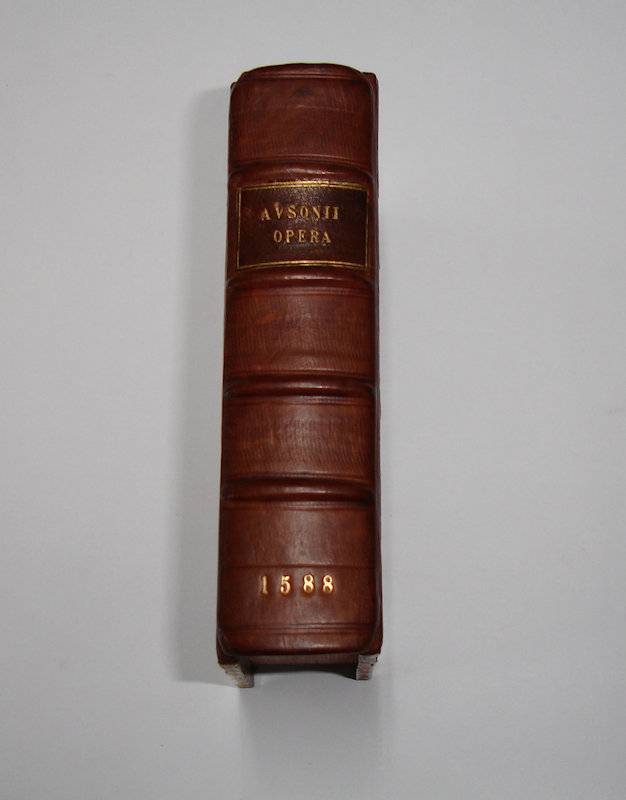AUSONIUS.
D. Magni Ausonii Burdig. viri consularis opera. A Iosepho Scaligero, & Elia Vineto denuo recognita, disposita, & variorum notis illustrata (...) Adiectis variis & locupletissimis indicibus.
(Geneve), Typis Iacobi Stoer, 1588.
16mo. 2 volumes in 1: (XXXII),350;247,(1 blank),(14 indices) p. 18th century calf, back recently and decently restored. 13 cm (
Ref: GLN-3290; Schweiger 21; Graesse I,259; Smitskamp p. 118) (
Details: Back with 4 raised bands, recently and expertly restored. Morocco shield with gilt lettering in second compartment. Boards with blind triple fillet borders. Elaborately blind tooled rectangles on both boards. Edges of the boards gilt, edges of the bookblock dyed red. Title within woodcut borders, right edge of the title slightly cut short. The second volume has a title of its own, it contains 'Iosephi Scaligeri Iul. Caes. F. Ausonianarum lectionum libri duo', to which have been added notes of A. Turnebus, Hardianus Junius, G. Canter, J. Lipsius & E. Vinetus) (
Condition: Endpapers renewed. First title slightly soiled and having a name on it)
(Note: Decimus Magnus Ausonius of Burdigala (Bordeaux), ca. 310-394, was according to H.J. Rose an example of the senile degeneration of 4th century Latin literature, and the first glimmer heralding the full day of French literature. He wrote trifles, sometimes pretty or clever, often tiresome. (H.J. Rose, 'A History of Latin Literature', London 1967, p. 527/29). H.G. Evelyn White, the editor of the Loeb edition, is even more negative: 'As poetry (...) the great mass of his verse is negligible'. The chief value of Ausonius' work is according to him historical. (Loeb Classical Library, Ausonius, Cambr. Mass., 1919. p. VII) The 'Neue Pauly' is more positive: 'Ausonius repräsentiert eine Kultur der Bewahrung und des Erbes. Allenthalben greift er auf die griech. und lat. Lit. zurück, über die er souverän verfügt, und gestaltet anspielungs- und voraussetzungsreiche pretiöse Gebilde von formalem Raffinement'. (Der Neue Pauly, 2,334) Alexander Souter is in the Oxford Classical Dictionary full of praise: 'His numerous poems, written in various metres (...) are of considerable interest, in both subject-matter and style. There are over a hundred epigrams, some of which are in Greek and others translated from Greek. There are 25 letters. His correspondence with Paulinus of Nola is the most notable part of these. The
Ephemeris includes many poems in various metres, dealing with daily life. The
Parentalia is a collection of short poems in memory of deceased relatives of the poet. The
Commemoratio Professorum Burdigalensium is of interest for the history of education. (...) This account by no means exhausts the list of minor poems, throughout which the author's minute knowledge of Virgil is apparant and his Christian faith is not obtruded. His most important poem is the
Mosella which still attracts readers. It is a rhetorically fashioned laudatio in 483 hexameters and describes in considerable detail the various fish to be found in the river as well as some of the fine buildings on the banks and other features, the whole constituting a series of episodes, composed, like the rest of Ausonius' verse, according to rule'. (OCD 2nd ed. p. 154)
§ The 2 French scholars mentioned on the title, Joseph Juste Scaliger,1540-1609, and Elie Vinet, or Elias Vinetus, 1509-1587, had probably nothing to do with the editing of this new Ausonius edition of 1588. It was produced, according to the very short preface, by the jurist P.B. Cestius I.C, or Petrus Baudoza Cestius, 1557-1627. It is further explained that it is based on the earlier edition of Scaliger, Antwerp 1575, with corrections of typographical errors. Vinetus had published an edition with his commentary in 1580) (
Provenance: Name on title: 'Jacobus Levinus'. At the end of volume 1 written: 'John Rocherus, 1794') (
Collation: ¶-¶¶8 a-y8 (minus blank leaf y8); A-Q8, R4 (minus last blank leaf R4) (Photographs on request)
Book number: 120207 Euro 920.00
Keywords: (Oude Druk), (Rare Books), Ausonius, Dichtung, Latin literature, Poesie, Spätantike, Swiss imprints, antike altertum antiquity, late antiquity, poetry, römische Literatur
 AUSONIUS.
AUSONIUS.